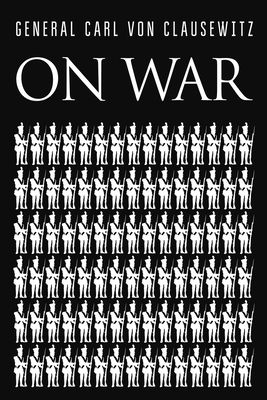On War

On War
On War (German: Vom Kriege) is a book on war and military strategy by Prussian general Carl von Clausewitz, written mostly after the Napoleonic wars, between 1816 and 1830, and published posthumously by his wife Marie von Brühl in 1832. It is one of the most important treatises on political-military analysis and strategy ever written, and remains both controversial and influential on strategic thinking.
On War is an unfinished work. Clausewitz had set about revising his accumulated manuscripts in 1827, but did not live to finish the task. His wife edited his collected works and published them between 1832 and 1835.
His ten-volume collected works contain most of his larger historical and theoretical writings, though not his shorter articles and papers or his extensive correspondence with important political, military, intellectual and cultural leaders in the Prussian state.
General Carl von Clausewitz was among those intrigued by the manner in which the leaders of the French Revolution, especially Napoleon, changed the conduct of war through their ability to motivate the populace and gain access to the full resources of the state, thus unleashing war on a greater scale than had previously been seen in Europe. Clausewitz believed that moral forces in battle had a big influence on its outcome. Clausewitz was well educated and had strong interests in art, history, science, and education. He was a professional soldier who spent a considerable part of his life fighting against Napoleon. He had experienced the French Revolutionary Army's (1792-1802) zeal versus the old order's compulsive recruitment armies. The insights he gained from his political and military experiences, combined with a solid grasp of European history, provided the basis for his work.
A wealth of historical examples is used to illustrate its various ideas. Napoleon and Frederick the Great figure prominently for having made very efficient use of the terrain, movement and the forces at their disposal.
PRP: 223.14 Lei
Acesta este Prețul Recomandat de Producător. Prețul de vânzare al produsului este afișat mai jos.
200.83Lei
200.83Lei
223.14 LeiIndisponibil
Descrierea produsului
On War (German: Vom Kriege) is a book on war and military strategy by Prussian general Carl von Clausewitz, written mostly after the Napoleonic wars, between 1816 and 1830, and published posthumously by his wife Marie von Brühl in 1832. It is one of the most important treatises on political-military analysis and strategy ever written, and remains both controversial and influential on strategic thinking.
On War is an unfinished work. Clausewitz had set about revising his accumulated manuscripts in 1827, but did not live to finish the task. His wife edited his collected works and published them between 1832 and 1835.
His ten-volume collected works contain most of his larger historical and theoretical writings, though not his shorter articles and papers or his extensive correspondence with important political, military, intellectual and cultural leaders in the Prussian state.
General Carl von Clausewitz was among those intrigued by the manner in which the leaders of the French Revolution, especially Napoleon, changed the conduct of war through their ability to motivate the populace and gain access to the full resources of the state, thus unleashing war on a greater scale than had previously been seen in Europe. Clausewitz believed that moral forces in battle had a big influence on its outcome. Clausewitz was well educated and had strong interests in art, history, science, and education. He was a professional soldier who spent a considerable part of his life fighting against Napoleon. He had experienced the French Revolutionary Army's (1792-1802) zeal versus the old order's compulsive recruitment armies. The insights he gained from his political and military experiences, combined with a solid grasp of European history, provided the basis for his work.
A wealth of historical examples is used to illustrate its various ideas. Napoleon and Frederick the Great figure prominently for having made very efficient use of the terrain, movement and the forces at their disposal.
Detaliile produsului













